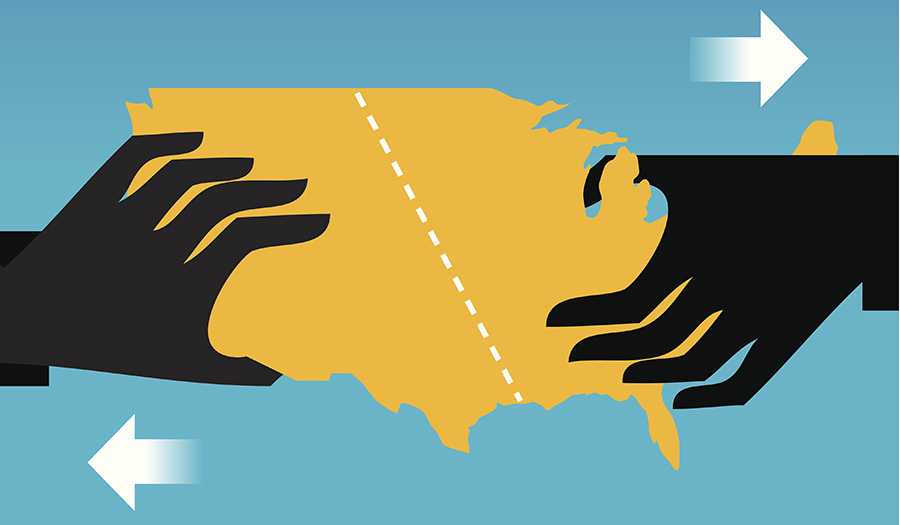 Getty Images
Getty Images
Article
Learn the why behind the headlines.
Subscribe to the Real Truth for FREE news and analysis.
Subscribe NowRemember when Donald Trump was impeached? That historic event happened on December 18, 2019, but it might as well be the year 1719. It is ancient history in terms of divisive events plaguing the U.S. throughout 2020.
Of course, the Democratic-led House of Representatives filing two articles of impeachment against the nation’s president—abuse of power and obstruction of Congress—initiated a trial in the Senate.
The Republican-led Senate acquitted the president of these charges on February 5, a move that further pushed U.S. citizens apart. At that time, 47.6 percent of Americans supported removing Mr. Trump from office, FiveThirtyEight reported. That total was an overwhelming 84.3 percent of Democrats and a mere 9 percent of Republicans. Independents made up the rest.
Such stark disagreement stained the entire year.
George Floyd’s death at the hands of the police moved the discord from halls of power to streets across the nation. Recall how you felt when Minneapolis was set ablaze. Then Washington, D.C. Then New York…
At the time, The Real Truth wrote about the difficulties of reporting on the subject of race in the article Why Can’t America Find Justice and Peace?
“Racial tension is perhaps the thorniest issue in the United States,” we said at the time, “yet some facts are undeniable.
“Clearly inequality exists. One example: Despite black Americans making up just 12 percent of the nation in 2017—they make up 33 percent of the prison population, Pew Research found in 2017. Conversely, whites make up 64 percent of the U.S.—and a mere 30 percent of inmates. From this and many other statistics, the protesters have a point. Something is wrong here.
“Yet it is also wrong to pelt police officers with frozen water bottles and fiery insults. As is breaking into ATMs and looting iPhones from an Apple Store.
“Herein lies a conundrum. If you say one potentially critical thing about violent protesters, you can find yourself inadvertently branded a racist—even if you agree there are systemic problems in the U.S. Same is true when empathizing with the police, many of whom are merely doing their jobs.”
As the tension ratcheted ever upward, many Americans stopped listening to each other at all.
The New York Times documented this change. In September 2019, a group of 526 Republicans, Democrats and independents were brought together in Dallas from every walk of life. They were voters who were “feeling pretty good about the state of American democracy. They believed their differences weren’t so vast. They believed they could talk to one another. They thought compromise might even come of it.”
For several days, they discussed climate change, the economy and immigration. They left “feeling hopeful that American politics writ large could resemble something so civil.”
Yet, the paper noted, “That was before the impeachment, the pandemic, the civil unrest and the recession. Before protesters clashed in Portland, Ore., and Kenosha, Wis., and before angry voters rallied against mask mandates and lockdowns.”
In follow-up interviews a year later, many of these optimistic voters sounded despondent.
“It’s really unfortunate, outside of that bubble that we had in Dallas, seeing this untamed beast that is the real world,” a 24-year-old Republican from Providence, Rhode Island, told the Times. “It just isn’t civil, it isn’t constructive, and it’s really not conducive to us moving forward as a country as united.”
Similarly, a 74-year-old Democrat from Albuquerque, New Mexico, “worried that Americans now seldom work together across different viewpoints, or prize a range of viewpoints at all.”
Realize this was all stated before the presidential election. Imagine the sentiments now…
Before digging into the election results, think of the other contentious events throughout the year: There was the death of liberal Supreme Court Justice Ruth Bader Ginsburg, who was replaced by conservative Amy Coney Barrett. There was the debate of whether Confederate statues are history or hatred. There was a newly approved coronavirus vaccine—about half of U.S. adults are unsure if they want to get vaccinated against the coronavirus or say they will not at all, an Associated Press-NORC Center for Public Affairs Research poll found.
Now, here we are in the post-election hellscape. The divisive results of the 2020 vote have eclipsed the subjects of race, health and climate. Both those on the left and right see this as a battle for the soul of the nation.
Before the votes were cast, our article America’s Choice? stated: “Politicians and journalists are right to say that we live at a unique time in history. The COVID-19 pandemic even comes with the euphemistic tagline ‘these unprecedented times.’ So…conditions are ripe for post-election clashes as never seen before. The internet has given rise to a post-truth era with many living in ideological echo chambers—where incorrect beliefs are never questioned and instead root in deeper over time. This trend can be found among conservatives and liberals alike.”
A couple of months later and these words cannot be any truer. A Northeastern, Harvard, Northwestern, and Rutgers poll found that 40 percent of Republicans believe Mr. Trump won a second term, with another 23 percent unsure of the victor. Many GOP lawmakers and attorneys general back the president’s claims of widespread fraud—and see the Democrats as stealing the election. The Democrats shoot back accusing the Republicans of eroding trust in the electoral system and even of attempting a coup.
A columnist for Time magazine wrote in September that, for the last few years, he has “been watching the increase in partisan enmity in the U.S. with growing alarm. Multiple social, cultural and religious factors are converging to create a particularly toxic political stew. America is being pulled apart. This phenomenon is geographic, ideological and spiritual.”
He continued: “It is clear that partisan Americans dislike each other a great deal. We live separately, snarling at each other across a growing divide. The result is a politics of fear and rage, where policy differences often take a back seat to the list of grievances that red possesses against blue and blue against red.
“Nothing I’m outlining here is new. Commentators have called our dysfunctional politics a form of ‘cold civil war,’ and the assumption is that one side or the other will win, dominate the opposition and rule a united country.
“Over the past decade, I’ve heard committed partisans say out loud that they would be ‘happy’ to be rid of states like California. I’ve heard (and read) men fantasizing and theorizing about a second Civil War. Right-wing insurrectionist groups have even formed for the purpose of fomenting civil strife. Look at the smoke drifting from U.S. cities from coast to coast. Watch far-right and far-left protesters square off in street battles. There is a crackling tension in the air.”
That palpable tension brings to mind the words of Abraham Lincoln, who quoted Jesus Christ: “A house divided against itself cannot stand” (Matt. 12:25).
Lincoln was speaking at a Republican state convention in 1858 as the nation was hurtling toward civil war. He continued: “I believe this government cannot endure, permanently half slave and half free.
“I do not expect the Union to be dissolved—I do not expect the house to fall—but I do expect it will cease to be divided.”
“It will become all one thing or all the other.”
Of course, the Civil War came a few short years later. Some 750,000 men lost their lives before the Union was restored.
As Americans drift further apart in their beliefs and convictions, more and more talk has begun about a Civil War II. Throughout 2020, news outlets on every part of the political spectrum have asked this question. A few headlines:
• “A Bleak ‘What If:’ Is The US Headed Towards A Second Civil War?” (WBUR)
• “Disunited states: Could a second Civil War—and an end to the union—really happen?” (Salon)
• “The Origins of Our Second Civil War” (National Review)
• “This model forecast the US’s current unrest a decade ago. It now says ‘civil war’” (ABC News)
• “Is the U.S. Already in a New Civil War?” (Vice News)
Again, think of Christ’s words: “A house divided against itself cannot stand.”
Christ did not lie. The U.S. will not stand much longer without healing its divisions. The problem, however, is that Americans cannot seem to agree on anything. The moral, ethical and religious beliefs held by both sides keep them back from considering the other side. Each side thinks it is firmly in the right.
Another Bible passage is instructive here: “Can two walk together, except they be agreed?” (Amos 3:3). The obvious answer is no!
Yet realize God is speaking in this verse to the nations of Israel. America would do well to apply what is written here. The nation cannot walk together unless it looks to what God has to say on every subject.
In this process, everyone would need to set aside their currently held beliefs and listen to the plain words of the Bible. Everyone would need to believe what God says in Isaiah 55: “For My thoughts are not your thoughts, neither are your ways My ways, says the Lord. For as the heavens are higher than the earth, so are My ways higher than your ways, and My thoughts than your thoughts” (vs. 8-9).
Getting everyone in the U.S. on the same page can seem impossible. Yet it is not. The Bible has much more to say to this nation. It is quite explicit! Read America and Britain in Prophecy to learn what God truly wants for “the land of the free.”
- Real Truth Magazine Articles
- POLITICS
 America’s Choice?
America’s Choice?


